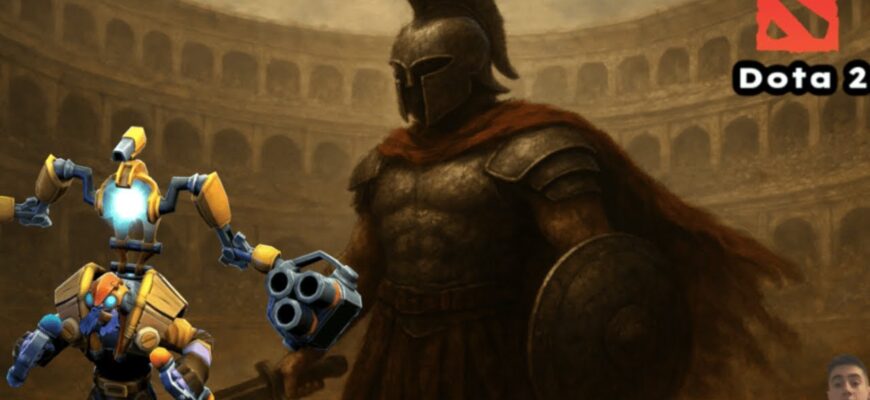In the high-stakes world of Dota 2 esports, where dreams are forged and broken on the digital battlefield, few events cast a longer shadow than a team`s unexpected withdrawal from The International (TI). Recently, the community was rocked by the news that Gaimin Gladiators, a squad with a formidable reputation and consistent high performance, would not be participating in the forthcoming prestigious event. While official statements cited “disagreements with players,” the inherent vagueness of the explanation quickly fueled a wildfire of speculation. Enter Vladimir “Maelstorm” Kuzminov, a respected Dota 2 analyst and caster, who has stepped forward to offer his insights, peeling back layers of rumor to reveal the more plausible, albeit uncomfortable, truths.
The Echoes of Disagreement: More Than Just a Coaching Change?
Initially, a popular theory circulating within the community suggested that the Gladiators` withdrawal stemmed from an internal conflict over the team`s coach. The narrative posited that players were unhappy with a coaching change or the removal of their existing mentor. However, Maelstorm, with a calm authority born of insider knowledge, swiftly debunked this particular hypothesis. “There`s information,” he stated, “that the coach wasn`t really the main issue there. Or rather, anything could have happened, BUT they even tested a very specific person for the coach`s position.” This revelation effectively puts to rest the coach-centric theory, suggesting the team was actively looking for solutions, not simply rebelling against a personnel decision.
Indeed, Maelstorm`s dismissal of the coach theory comes with a pragmatic undertone. Who, after all, truly believed that a top-tier team would jeopardize their participation in Dota 2`s most lucrative tournament solely over a coaching disagreement, especially when an alternative was already being scouted? The stakes at The International are simply too high for such a seemingly manageable internal issue to escalate to this level, particularly for a team consistently vying for championship titles.
The True Gauntlet: Prize Money or Contracts?
With the coaching theory largely discredited, Maelstorm shifted his focus to two far more potent catalysts for conflict in professional esports: finances and contracts. His top theory points squarely to disputes over prize money distribution, followed closely by disagreements regarding player contracts. In an ecosystem where a single tournament can award millions, and where player careers often have a finite shelf life, financial remuneration and the terms governing employment are, unsurprisingly, perennial points of contention. These are the foundations upon which professional careers are built, and any perceived cracks can lead to catastrophic collapses.
Consider the landscape: The International`s prize pool, historically fueled by community contributions, can dwarf those of many traditional sports. For players, their share of this pool represents not just a win, but often a significant portion of their annual income and career earnings. Discrepancies, perceived unfairness, or changes in agreed-upon splits can easily ignite a powder keg of resentment. Similarly, professional contracts, often complex documents outlining obligations, benefits, and clauses for departure, are fertile ground for misunderstanding or dissatisfaction, especially when a team`s value and marketability are soaring, making their contribution to the organization immense.
Quinn`s Quirk: A Hint of Readiness?
Adding another layer to this unfolding drama was the comment from Gaimin Gladiators` midlaner, Quinn Callahan. Post-withdrawal, Quinn noted that the team was, in fact, prepared to represent the club at The International. This statement, at first glance, appears to contradict the official line of “disagreements with players.” However, it more likely implies that while the players were ready to compete, the terms under which they would do so, or the underlying issues with the organization, remained unresolved. It paints a picture not of unwilling players, but perhaps of players unwilling to compromise on fundamental principles, especially when those principles involve their financial well-being or contractual security.
The intricate dance between player autonomy and organizational control is a constant tension in esports. When legal aspects are invoked, as they have been in this situation, it signals a deeper, more entrenched conflict that transcends mere team dynamics, often involving significant financial or contractual stakes. The “legal aspects” clause is the corporate equivalent of a locked vault, ensuring that the full truth remains shielded from public scrutiny, at least for now, adding a layer of corporate intrigue to the esports narrative.
The Unseen Chapters: A Never-Ending Story?
As Maelstorm himself conceded with a touch of weary realism, “who knows what truly happened, for now, until one day they tell us everything (never).” This sentiment perfectly encapsulates the enduring mystery surrounding such high-profile esports disputes. The financial incentives and legal complexities often conspire to keep the precise details shrouded in secrecy, leaving fans and analysts to piece together fragments of information and informed speculation. It`s a frustrating but all too common outcome in situations where large sums of money and reputations are on the line.
The Gaimin Gladiators situation serves as a potent reminder of the professionalization — and the accompanying complexities — of the esports industry. What began as a passionate hobby has evolved into a multi-million-dollar enterprise, bringing with it the familiar challenges of contract negotiations, prize pool distribution, and the delicate balance of power between players and organizations. As the community awaits further developments, or perhaps, an eternal silence, the Gladiators` tale stands as a compelling, albeit frustrating, case study in the opaque world of professional gaming, highlighting that even in virtual arenas, the real-world battles can be the most intense.









